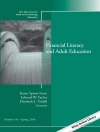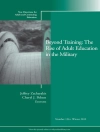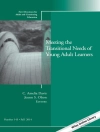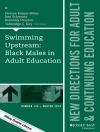This multi-disciplinary collection addresses issues relating to current or former practitioners within the context of higher education. Drawing together a range of voices, the contributors explore contemporary issues organised around three core themes of pracademic identities, professional development, and teaching practice. Underpinned by theoretical frameworks, reporting empirical findings, and adopting a reflective lens, this critical examination draws on a range of experiences to provide a deeper understanding of the contribution of pracademics within the sector for stakeholders, including leaders, policy makers and professional bodies, and current and future pracademics.
Dedicated to highlighting the potential of the pracademic contribution, this collection explores key topics including building networks, practice-informed teaching, consultancy, and collaborative research. Contributions investigate some of the practical barriers faced by pracademics making the transition into higher education, including imposter syndrome, cultural adjustment, and managing dual professional identities. The aim of this collection is to champion the benefits of a diverse academy for everyone involved.
表中的内容
1. Introduction.- Theme 1 – Pracademic Identities.- 2. The Value of ‘Things’: how objects and artefacts can enrich professional reflection.- 3. The Pracademic, where practice meets theory. The value of practitioner experience when teaching and researching in a Higher Education (HE) environment.- 4. ‘Double vision: personal agency and cultural capital’ – Terrence Gregory – Institute of Contemporary Music Performance.- 5. Imposter Syndrome and the Non-Pracademic.- 6. From Novice to Expert – there and back again; a lecturer’s tale.- 7. The Mirrored Mask: Behind the Mask: Reflections on a pracademic’s journey.- 8. Don’t take your Briefcase’ Navigating a career change from professional practice to the academic role.- 9. Finding your people’: the role of networks in pracademic identity construction.- Theme 2: Professional development.- 10. Pracademics: Facilitating Smooth Transition from Industry to Academia.- 11. [Working draft title to be confirmed].- 12. [Working draft title awaited] .- 13. The Pracademic as Consultant: Professional educator development through collaborative inquiry with practitioners.- 14. Resilient networking and collaboration – Looking for a roadmap. Is it possible to balance being a practitioner and a researcher?.- 15. The Transition from Practice to Academe in Criminal Justice.- Theme 3: Teaching Practice.- 16. Pracademics in Construction and Engineering Higher Education: a return to Classical Educational norms.- 17. Pracademics – uniquely placed to enhance student employability?.- 18. More than mere context: the role of former practitioners in surveying education.- 19. Those who can, do (and teach): Developing simulations to bring practitioners and students together.- 20. The Value of Autonomy in Clinical Pedagogy.- 21. Conclusion.
关于作者
Jill Dickinson is an Associate Professor in Law at the University of Leeds and Senior Fellow of Advance HE. A former Solicitor, Jill has around 25 years’ combined experience in teaching, research, and legal practice and her research around place-making, learning landscapes, and professional development has led to the development of communities of practice with organisations including Advance HE.
Teri-Lisa Griffiths is a Senior Lecturer in Criminology at Sheffield Hallam University. As a former careers adviser, Teri-Lisa is interested in how spaces for education and professional identity can influence career and development choices. As the Year Tutor and Employability Lead for Criminology, an awareness of how institutional and national policy initiatives impact on course delivery is influential in her work.












